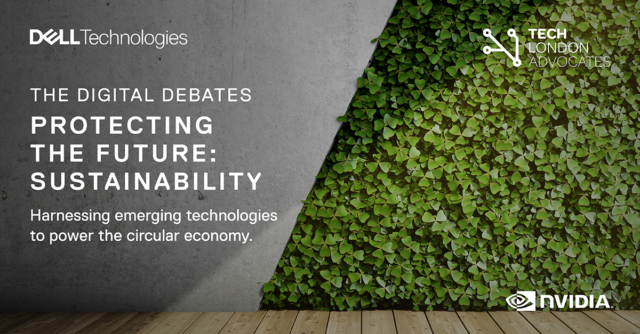We recently held our fifth and final episode of our first Digital Debates series in partnership with Tech London Advocates (TLA) and NVIDIA. Hosted by TLA founder Russ Shaw CBE, a panel of industry leaders joined me to discuss how we advance sustainability and accelerate to a net zero future.
For this conversation, we wanted to look at how organisations act more sustainably to reduce their carbon emissions and make a positive impact on the environment; and to inform their actions, how they gain access to data that helps them to measure their impact.
On the panel, I was joined by Zack MacFarland, Inception Partner Manager at NVIDIA; Dr Matt Kennedy, Director of Climate Services and Sustainability at Arup; Jan Lozek, Founding and Managing Partner at Future Energy Ventures; and Anna Campbell, Client Engagement & Delivery at Climax Community.
The sector diversity of this panel allowed for a wide-ranging conversation that included large scale industry, SME, investor and startup perspectives, which emphasised the importance of cross sector collaboration.
Collaboration over competition
Arup’s Dr Matt Kennedy highlighted that being actively engaged in initiatives such as the UN’s Race to Zero, the World Green Building Council and the Coalition for Climate Resilient Investment, are also important dimensions in holding key industry players to account. Collective commitments keep businesses striving for progress.
Publicly available online toolkits, which support organisations in delivering on the circular economy and increase accessibility to actionable climate mitigation strategies, will also be vital going forward.
Data: measuring and monitoring
You cannot manage what you have not measured. The ability of companies to make positive progress to net zero is reliant on the ability to monitor their environmental impact. Technology is a key enabler for the sustainability agenda on this front.
Through measurement, organisations can identify the most significant sources of emissions across their value chains and where there are strengths and weaknesses in their business models. This provides the basis from which organisations can build their sustainability strategy. This data is integral to informing how a business goes on to engage with suppliers, set procurement standards, design products and source materials.
Addressing all aspects of your footprint
At Dell Technologies, we have been focused on climate change and reducing our greenhouse gas (GHG) emissions for decades. We will decarbonise our business by 2050 through strong short- and long-term goals driven by technological innovation, increased adoption of renewable electricity and climate science.
However, no single company can tackle climate change on its own. Avoiding the worst impacts of global warming takes everyone. It is why we are also putting our technology to work to help our customers, value chain and society transition to net zero.
Our focus on the circular economy plays a role in contributing to reduced emissions and environmental impact for our company. Driven by the idea that nothing goes to waste, our product development process is advancing towards our 2030 goal to reuse or recycle a product for every one sold, and to achieve all of our packaging and over half of all product content made from 100% recycled or renewable materials. This focus on reuse contributes to lower emissions in the manufacturing process when compared to using new (or virgin) materials.
One example of how we are driving innovation to decarbonize our products is Concept Luna, a prototype for the future of sustainable laptop design which explores revolutionary ideas to accelerate reuse of products and materials, reducing waste and emissions for the future.
Making Progress
Our panellists agreed that the benefits of a green transition are clear in the talent, customer, investor and commercial opportunities they attract. They called on founders to embrace and embed sustainable practices into their business models and strategies, and look towards networks and co-operation with partners in order to support this acceleration.
Ultimately, our speakers were optimistic about advancing sustainability because of the power of technology to drive collaboration, mobilise accessible climate mitigation actions, enable the right decisions to be made, increase efficiencies, and deliver meaningful change.
Watch the Digital Debates here.



